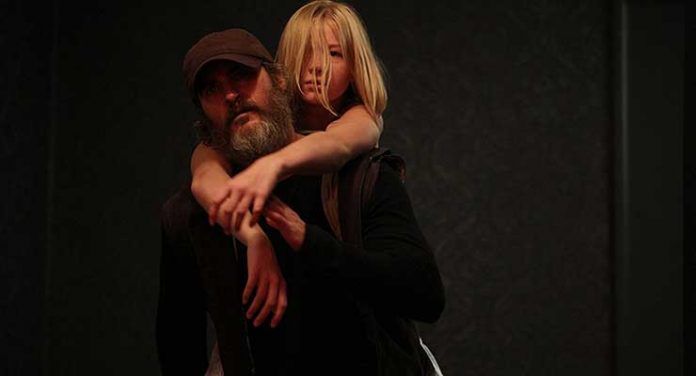
After disrupting a sex trafficking ring Joe has a ton of heat on him and is spotted by his middleman’s son after cleaning out the brothel. This leads to some very unsavory setting their sights on Joe and his mother. The rabbit hole goes even deeper and it is implied that one of the victims of the sex trafficking operation was being abused and exploited by a high-ranking official with some serious clout.
The film is Lynne Ramsey’s follow-up to her critically acclaimed film We Need to Talk About Kevin, which was released in 2011. You Were Never Really Here is a tight and taught thriller that showcases Phoenix’s intensity – you see him as a highly trained brutal killer inflicting carnage, but then you see him as a loving son taking care of his elderly mother in his childhood home. These scenes are intercut with flashbacks of his childhood, which was traumatizing, and to a few of his military assignments.
I remember when I first saw the trailer to You Were Never Really Here and I thought to myself that it reminded me of Taxi Driver, Drive, and Oldboy. I wouldn’t go as far as comparing this film to Taxi Driver due to Joe not necessarily being psychotic – I never saw a Travis Bickle similarity. Joe is not a disconnected person like Travis was, he is very much in tune to his environment.
Another thing that elevates You Were Never Really Here is its controlled use of violence. Joe’s close-quartered combat weapon of choice a steel ball peen hammer. He smashes people in the head and face with it until they are dead. These scenes are always shot with more of an emphasis on the force of the hit (with sound design) or a cutaway, or an image of a security camera with the aftermath showing a body lying on the ground. The hand-to-hand combat style in this film is not as graphic as the promotional materials are making it seem. It’s definitely not Oldboy.
You Were Never Really Here also has a great visual aesthetic. Ramsey and her team have design a sleek environment where very real monsters live. This drives the psychological element forward – I also would categorize it as a slow burn type of film, as well. The irony of my slow burn comment is that the film runs for 89 minutes, with credits, so you would think that the film does not have time to slow down.
It is with these flourishes that Lynne Ramsey has crafted one of the better films of 2018.The film is highly recommended.
[amazon_link asins=’B0797HXX16′ template=’ProductAd’ store=’theaterbyte-20′ marketplace=’US’ link_id=’3b983d75-4344-11e8-aebd-f983cbd9fb67′]
You Were Never Really Here is playing in limited release and opens wide April 20th
Be the first to leave a review.


